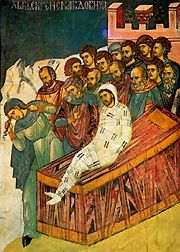2nd
November Trinity
November
8, 2015
Rev.
3, 14-22 (Laodicea)
And to the leading angel of the community at Laodicea
write: Thus speaks the Amen, he who strengthens all spiritual working with his
own being, the witness trusted and true, the ground of all divine creation:
I see through your deeds. You are neither cold nor hot.
You should be either cold, or hot. But since you are lukewarm, I am about to
spew you out of my mouth.
You say: I am rich, I have my fortune, and I don’t need
anything else. But you do not know that you are wretched and pitiable, a beggar
blind and naked. I counsel you to acquire from me
gold that is purified in fire,
that you may become truly rich;
and garments to clothe yourself,
so that the shame which lies in your nakedness may not be revealed;
and a salve to anoint your eyes,
that you may see.
 |
| Christ the Light of the World, Holman Hunt, wiki |
I AM he who disciplines all whom he loves, calls them to
account and refines them through trials of destiny, thus drawing them into the
stream of cleansing.
Therefore generate warmth [be eager] [strengthen
yourself] and change your heart and mind.
Behold, I stand before the door and knock. If someone
hears my voice and opens the door, I will come in to him, and share the meal
with him, and he with me.
He who overcomes, to him I will give the power to sit
with me on my throne, just as I have been raised to the throne of my Father
through the victory of the spirit. He who has ears to hear, let him hear what
the spirit would say to the churches.
November
8, 2015
Rev.
3, 14-22 (Laodicea)
One of the illusions
of our modern consciousness is that we stand alone. We may experience ourselves
as enclosed and isolated within our own skin. And therefore we try to draw
toward ourselves everything, money, possessions, that seem to reinforce our
sense of self-sufficiency.
These letters to the congregations tell us otherwise. For
truly we are embedded in a world of spiritual beings. “We walk through the
spiritual worlds exactly as we walk through the physical air”.[1] And although we may be
unaware of them, the consciousness of these beings extends beyond and into our
own. Alone though we may feel ourselves to be, we are continuously being seen,
watched over, cared for and cared about. It is because we are not aware of them
that we can act as though they don’t exist. We are like small children playing
peek-a-boo who ‘hide’ by covering their eyes and saying ‘you can’t see me!’ The
human race has made itself blind.
One of the signs of spiritual adulthood is becoming aware of
the other – of other people, of other beings. As we grow spiritually we can
become aware that we are seen, that we cannot hide. We become aware, sometimes
painfully, of our shortcomings and failings. This is a first step toward
healing.
Ultimately
we are accountable. As the funeral service of The Christian Community says:
Know that you are beholden to the spiritual beings for everything that you do
in thought, in speech, in action. Today’s reading urges us to change the way we
frame our awareness, to enlarge it. The spiritual world, Christ and his angels,
are knocking at the door of our awareness. We have the choice to open, or not.
If we do, they will nourish and strengthen our own awareness, our souls and
spirits.
[1]
Source: Rudolf Steiner – GA 194 – The Mysteries of Light, of Space, and of the
Earth – Lecture III – Dornach, 14th December 1919













